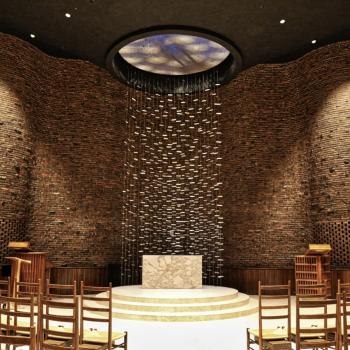God Bless America has become one of our country’s most beloved patriotic songs. But its beauty and power mask an underlying danger for us Christians.
Written in 1938 by Irving Berlin, the song celebrates the fertility and beauty of our land as evidence of God’s favor upon on us. But it’s not just a song of thanks and praise. It is also, literally, a prayer. It is a song that asks for God to stand beside us and guide us.
Today that need seems obvious, but it was even clearer in 1938, with the clouds of fascism gathering in Europe. When it was written, God Bless America wasn’t just asking for God’s presence, but also for His protection in an increasingly hostile world.
A National Story
Like all songs that have attained mythic status, God Bless America has taken on additional resonances. When we sing it as part of July 4th celebrations, surrounded by flag-waving children, political speeches, and flyovers, it becomes part of a complex of symbols that, taken together, tells a powerful story about America: We are a country that has been richly blessed by God and that has always been aware of the importance his presence. We are a beacon of light to the rest of the world, a shining example of a nation committed to the values and principles we have learned from our faith. As our official national anthem says, we are the land of the free and the home of the brave.
We are also a land of opportunity, and no one demonstrated the possibility of achieving the American Dream than Irving Berlin himself. Born Israel Beilin to a father who was as cantor in the synagogue, Berlin arrived in the United States from Russia as a small child. As his boat approached New York City in 1888, I can imagine him gazing on the brand-new Statue of Liberty, her torch’s light glinting off her still-copper-colored garments. Only a few decades later, having changed his name, he had become one of his adopted country’s most popular and influential musicians, having transformed American music in the process.
God Bless America is therefore not just about some idealized notion of “America.” Penned by an immigrant in the shadows of a world war, it was a musical representation of an American story in which Irving Berlin could easily recognize himself as a character. Millions ever since have felt the same way.
The Song’s Musical Power
Like a great hymn, God Bless America’s power lies not just in its words, but in the ways its music carries its message, the way it makes us feel. That’s what makes it not just a patriotic song, but an anthem: a symbol of our country that rings true for million and helps us to understand ourselves.
Here’s how it works in this song. In the first half the melody is low and humble, perfectly matching the supplication in its lyrics. But in the second half, as the lyrics meditate upon the land that God has provided, the melody begins to rise, carrying us from image to image, building in intensity step by step: “from the mountains…to the prairies…to the oceans white with foam…” It’s like we are climbing the steps of the Statue of Liberty herself, approaching her beacon of light that shedding its light from sea to shining sea. And when we finally get to the top, to the highest, triumphant note of the melody, who do we find waiting for us? God, of course. Berlin’s melody allows us to sing the holy name on the highest and loudest note of the melody, giving us the chance to raise our voice to our Creator in full-throated praise.
For many American Christians, the song confirms what we already believe: that the United States has been especially chosen by God as a “city upon a hill”, a light to other nations, a bastion of liberty, and proof that a nation’s success depends upon its commitment to God.
And it does so in a way that speaks directly to our emotions, stirring up feelings of patriotism, joy, hope, and love for God. It’s a perfect patriotic hymn, an anthem that brings all American together to celebrate our national story.
A Powerful Song – But a Lousy Prayer
This powerful combination of music and lyrics makes for an overwhelmingly effective song. But it makes it a lousy prayer. And this is a key reason why American Christians need to be careful about uncritically accepting the song – and the national story it represents.
Unlike God Bless America, real prayer isn’t about building a case for why God should grant prayer, nor is it an attempt to prove that we are worthy to make a petition. Rather, it is about entering the presence of God with a heart open to His voice. While we may ask for something, we all know that prayer has to be about “thy will be done”, not “my will be done.”
The song is so satisfying to sing because it works so perfectly – too perfectly, in fact. Like a great ad campaign (or, dare I say it, a piece of propaganda), it works because it makes us feel good about ourselves. As we sing this song’s melody, carefully crafted to move us inexorably toward its climax, we carried along not by a meditation upon the character of God, but rather by our belief in what America is.
Ultimately, God Bless America, is a song about our voice, our desires, and our faith in the story of America that it triumphantly proclaims.
A Political Song
As thinking Christians – especially those of us living in a country in which Christian nationalism has become an increasing stain upon our faith – we need to be able to separate the patriotic dimension of this song from its theological dimension.
This can only start with we recognize that, like all anthems, God Bless America is fundamentally a political song. It’s not “political” because it encourages singers to vote Democrat or Republican, but because it argues for a particular way to understand our country. Like a fiery stump speech or a sentimental political ad, God Bless America makes a claim about truth, meaning, and power: in this case, that we have been blessed by God and that the United States needs God’s continued favor.
As a white American Christian, this story matches my experience: America is indeed a land of opportunity and freedom, where anything is possible, and God rewards those who follow Him. But this is not the only true story about America.
But I think about the many for whom America does not feel like “home sweet home”, whether due to casual racism or legalized discrimination. I think of Native Americans who – no matter how proud they are of their country – experience this song through the lens of the theft of their land in the name of a God of “justice.” And I think of those who are barely surviving on minimum wage while living in the richest country the world has ever seen.
So whereas for many of us the song is a blessing, for others it can be a curse: a cruel reminder that our country has failed to live up to its potential.
A Christian Response
So how do we respond to this song? How can we American Christians approach God Bless America and the national story it so powerfully proclaims?
First of all, don’t worry: we can certainly continue to sing it. It is an inspiring song that tells a story about America that is beautiful and aspirational. It gives us a story that we can believe in – and not just as fantasy, but because the hope it offers is indeed real. We are right in celebrating that success – and in continuing to pray, along with Irving Berlin – for God’s presence.
But we also need to temper our embrace of the song with an awareness of its political and theological power – and even its danger. Its message of patriotism and pride can make it easy for us to forget the fact that God is also with every country as well. It can keep us from recognizing that our allegiance is to Jesus, not to any country, ideology, or national story. This is idolatry; and we know how God feels about that.
So the next time you hear or sing this great anthem, hold onto it firmly but carefully. Celebrate that fact that it was written by a Jewish immigrant who lived out the American Dream, but don’t forget that his reality is not everyone’s. Give thanks to God for the beauty of our land, but be aware that not all Americans can acknowledge that gift so easily. Sing it with joy and hope and fervent patriotism, but remember that, as Christians, the central story of our lives needs to be the one revealed in Jesus: that we are all children of God, and that we are called to follow our Savior through faith-filled lives dedicated to justice, love, and peace. These are values – both Christian and American – that we should celebrate, regardless of what song we sing.













